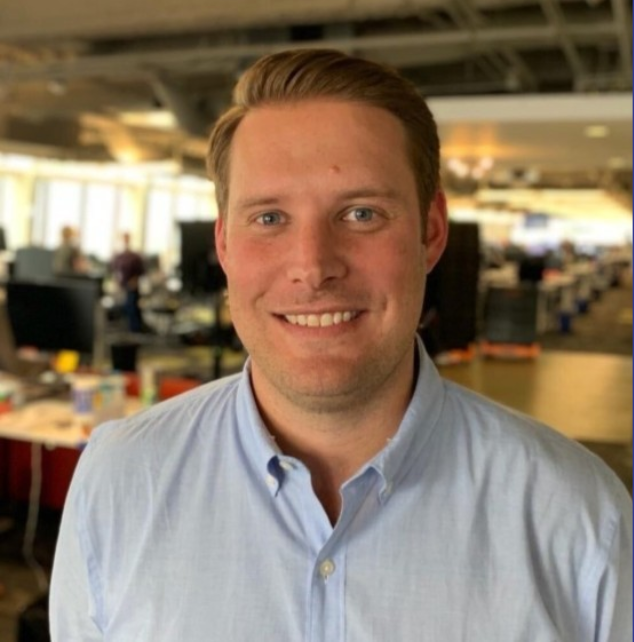
Sara Lindquist:
I'm Sara Lindquist from FUSE. We're an early-stage venture firm based right here in the Pacific Northwest - and just like the founders in our portfolio, we are just getting started. We believe that founders deserve more: more urgency, more community, more expertise, more reliability - more of everything. And we aim to deliver. Join me as I introduce each of our portfolio companies in the FUSE Family to date.
Today you'll hear from Ryan Soskin, Co-Founder and CEO of GoodShip. Join us to learn about how Ryan's decade of experience at companies such as Convoy and Coyote Logistics paved the way for starting GoodShip - and learn about how the business is transforming the way shippers and freight carriers operate.
Let's get started!
---------------------
Sara:
Ryan, thanks so much for joining me here today.
Ryan:
Yeah, absolutely. Thanks for having me. Good to see you.
Sara:
Well, it's great to see you as well, and I appreciate you taking the time to share a bit about your story and the GoodShip journey. So to kick things off, it would be great if you could just share a quick overview of what the company is and how it's going to serve customers.
Ryan:
GoodShip is a new enterprise SaaS platform serving the $800 billion domestic transportation industry. And more specifically, GoodShip is enabling shippers and freight carriers to digitally procure, measure and optimize contract business more easily and accurately than ever before. And so middle mile logistics is not only enormous, but also very antiquated, with countless disparate systems, many critical functions living in spreadsheets and email, and GoodShip's objective is to streamline and automate the most time-consuming and inconsistent processes such as contract procurement events, carrier scorecarding, shipper benchmarking, and a whole lot more.
Sara:
And Ryan, I was going to ask you if you could share a little bit about - you touched on it - but what has the previous process looked like for these companies?
Ryan:
The contract procurement piece for an enterprise shipper typically involves spreadsheets and email, and what they do is they run these annual bids. Sometimes they run them on a six-month cadence, but they send these spreadsheets to all their carrier partners - and it's a spreadsheet with sometimes thousands of rows, and every row represents a unique lane that they run with some level of consistency. And so the process is a lot of manual analysis, a lot of combing through these spreadsheets and figuring out for the carriers, which lanes do we have capacity for, which ones can we support, and then what's the pricing methodology we're going to apply. They'll put in their prices for the lanes they want to bid on, submit the spreadsheets, and then a whole bunch of manual analysis ensues for the shipper, and this goes back and forth three or four times with sharpening the pencil. So it's a really long and arduous process.
Sara:
Got it. Well, it's awesome that you guys are here to save the day! So my next question for you, Ryan - if you could share about your journey in general - so when did you first connect with David? And can you tell us a little about your past experience? I know you've had a long career in the space, and you both have experience at Convoy. So I'd love to hear about that. And then how did it lead you to building GoodShip?
Ryan:
I've been in and around the industry for, I guess, over 12 years at this point, across Coyote Logistics, Convoy, and then most recently Stord. And it's really been clear for a long time that the industry needs a significant overhaul of systems and technology. But the real catalyst, I think for me came over the past couple of years during the pandemic as supply chain turmoil and inflation have really dominated headlines. And what we're aiming to solve with GoodShip is not only workflow automation, but also better decision making, increased accountability among shippers and their carrier partners, which ultimately will work to promote supply chain stability, combat transportation related inflation for everyday goods, et cetera.
And so that's when it became clear that this was needed was just during the pandemic. But I met David, as you mentioned, in the very early days at Convoy. We were both part of the early team, and after having seen a lot of this stuff going on for, like I said, the past couple of years during the pandemic, David and I got back in touch earlier this year and decided that this was a problem worth working on.
Sara:
Love it. That's awesome. So obviously your experience just speaks to why you guys are the team to do it. But anything else to add there in terms of why you just feel so confident that A, you're the right team to solve it? And then B, I'd also love to hear about the culture you're trying to build at GoodShip as well.
Ryan:
I think that's right. Authenticity is really the word that comes to mind. Our team has been in the space, not only myself, but David and others on the team have been in the space for many years. We've seen legacy systems and processes up close and believe we have some of the earned secrets necessary to disrupt the status quo for contract freight and creating enormous value for the industry and ecosystem. And so not only do we have a lot of authenticity in this space, but the founders have perfectly complimentary skill sets between David and myself. And then the whole team also is not only very talented, but also has the grit, I think, necessary to overcome obstacles and really execute on the mission.
Sara:
Yes, and this is certainly a roll-your-sleeves-up type of industry and the customers you're trying to serve. So I love that, authenticity and grit. That's great. My next question for you has to do with the startup journey at large. Being a leader of a company is hard work and comes with many challenges. And as we discussed, you've spent the majority of your career in this space. So what keeps you excited to continue tackling this problem in the industry? What keeps you going, especially when many others have probably shied away from it?
Ryan:
The problem space is so large is the short answer, but the reason our team is so motivated to solve this and really have the will to keep going when things do get tough is just the far-reaching positive impact that GoodShip can have. And so trucking literally keeps the economy moving, representing 80%-plus of the nation's freight bill. And so efficiency gains translate into enormous improvements for shippers, for carriers, and ultimately for the end consumer. So it's just a really big opportunity that we can solve.
Sara:
Love it. That's great. Well, thank you for sharing that and kudos to you and the whole team for going and tackling this. You're really going to make a large impact. So in closing here, I have one final question for you. What, right now, do you need more of? How can anyone tuning into this help or get involved?
Ryan:
Thanks for asking. We're always looking to scale our team with talented full-stack engineers. So if any listeners know of anyone who might be interested in a high-impact opportunity on the ground floor, please feel free to email me, ryan@goodship.io. We're fully remote, we're well funded by great investors like FUSE, other tier-one VCs and several founders and CEOs of industry unicorns. So that's how we're looking to scale the team and appreciate any help there.
Sara:
Love it. Well everybody, you heard it here first. Come join this awesome team tackling a massive problem. Ryan, well, thank you so much. Really appreciate you sharing the story and look forward to seeing you and the whole team continue to crush it and change the lives of all the workers in the freight industry. So thank you for allowing us here at FUSE to be a part of it!
Ryan:
Yeah, my pleasure. Thank you for having me.
------------------
Sara:
If you're looking to join a stellar team that's seeking to serve a critical workforce, be sure to reach out to Ryan directly, just as he mentioned. Or feel free to reach out to us at FUSE as well, and we'll get you connected. Thanks for joining us, and we'll see you on the next one!
